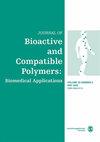Development of a chitosan/propolis-based polymeric system: Characterization, biocompatibility, and modulation of transcription factor expression
IF 2.2
4区 生物学
Q3 BIOTECHNOLOGY & APPLIED MICROBIOLOGY
引用次数: 0
Abstract
Chitosan (CHT) and propolis (P) are natural materials with antiseptic, anti-inflammatory, antimicrobial, and mucoadhesive properties with many applications in orthopaedia dentistry. The objective of this study was to develop a low molecular weight (LMW) and medium molecular weight (MMW) chitosan polymeric system with propolis at different concentrations (0.31%, 0.62%, 1.25%, 2.5%, and 5%) and to evaluate the effect in terms of their cell interaction with dental pulp fibroblasts. FTIR spectra of both molecular weights CHT’s films with propolis show increased transmittance bands at 1730–1720 cm开发壳聚糖/卫矛聚合系统:特性、生物相容性和转录因子表达调控
壳聚糖(CHT)和蜂胶(P)都是天然材料,具有防腐、消炎、抗菌和粘液黏附等特性,在牙科矫形中应用广泛。本研究旨在开发一种含有不同浓度(0.31%、0.62%、1.25%、2.5% 和 5%)蜂胶的低分子量(LMW)和中分子量(MMW)壳聚糖聚合物系统,并评估其与牙髓成纤维细胞的细胞相互作用效果。含有蜂胶的两种分子量 CHT 薄膜的傅立叶变换红外光谱在 1730-1720 厘米-1 和 1460 厘米-1 处显示出增加的透射带,表明有机基质中存在蜂胶乙醇提取物。通过接触角测试确定疏水性 随着蜂胶浓度的增加,用蜂胶功能化的 CHT 薄膜表面更疏水。细胞毒性显示了壳聚糖和蜂胶之间的协同作用;在蜂胶含量为 0.31% 的 LMW CHT 中观察到了最高的增殖率。用两种分子量的壳聚糖和蜂胶制成的膜在炎症阶段(先前用 LPS 处理过的细胞)可抑制 NF-k-B、MAPK 和血管内皮生长因子的表达。基于壳聚糖/乙醇提取物蜂胶的聚合物系统可能是未来治疗口腔溃疡的替代疗法。
本文章由计算机程序翻译,如有差异,请以英文原文为准。
求助全文
约1分钟内获得全文
求助全文
来源期刊

Journal of Bioactive and Compatible Polymers
工程技术-材料科学:生物材料
CiteScore
3.50
自引率
0.00%
发文量
27
审稿时长
2 months
期刊介绍:
The use and importance of biomedical polymers, especially in pharmacology, is growing rapidly. The Journal of Bioactive and Compatible Polymers is a fully peer-reviewed scholarly journal that provides biomedical polymer scientists and researchers with new information on important advances in this field. Examples of specific areas of interest to the journal include: polymeric drugs and drug design; polymeric functionalization and structures related to biological activity or compatibility; natural polymer modification to achieve specific biological activity or compatibility; enzyme modelling by polymers; membranes for biological use; liposome stabilization and cell modeling. This journal is a member of the Committee on Publication Ethics (COPE).
 求助内容:
求助内容: 应助结果提醒方式:
应助结果提醒方式:


